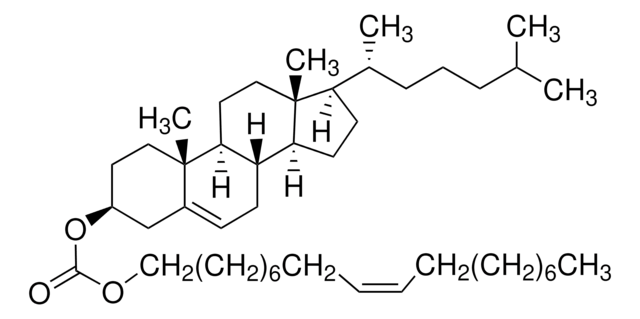C0289
Cholesteryl linoleate
≥98% (HPLC; detection at 205 nm)
Synonym(s):
3β-Hydroxy-5-cholestene 3-linoleate, 5-Cholesten-3β-ol 3-linoleate, Cholesteryl 9,12-octadecadienoate, Cholesteryl octadecadienoate
About This Item
Recommended Products
biological source
synthetic (organic)
Quality Level
Assay
≥98% (HPLC; detection at 205 nm)
form
powder
functional group
ester
shipped in
ambient
storage temp.
−20°C
SMILES string
CCCCC\C=C/C\C=C/CCCCCCCC(=O)O[C@H]1CC[C@]2(C)[C@H]3CC[C@]4(C)[C@H](CC[C@H]4[C@@H]3CC=C2C1)[C@H](C)CCCC(C)C
InChI
1S/C45H76O2/c1-7-8-9-10-11-12-13-14-15-16-17-18-19-20-21-25-43(46)47-38-30-32-44(5)37(34-38)26-27-39-41-29-28-40(36(4)24-22-23-35(2)3)45(41,6)33-31-42(39)44/h11-12,14-15,26,35-36,38-42H,7-10,13,16-25,27-34H2,1-6H3/b12-11-,15-14-/t36-,38+,39+,40-,41+,42+,44+,45-/m1/s1
InChI key
NAACPBBQTFFYQB-LJAITQKLSA-N
Looking for similar products? Visit Product Comparison Guide
Application
Biochem/physiol Actions
Packaging
Preparation Note
related product
Storage Class Code
11 - Combustible Solids
WGK
WGK 3
Flash Point(F)
Not applicable
Flash Point(C)
Not applicable
Personal Protective Equipment
Certificates of Analysis (COA)
Search for Certificates of Analysis (COA) by entering the products Lot/Batch Number. Lot and Batch Numbers can be found on a product’s label following the words ‘Lot’ or ‘Batch’.
Already Own This Product?
Find documentation for the products that you have recently purchased in the Document Library.
Customers Also Viewed
Our team of scientists has experience in all areas of research including Life Science, Material Science, Chemical Synthesis, Chromatography, Analytical and many others.
Contact Technical Service













